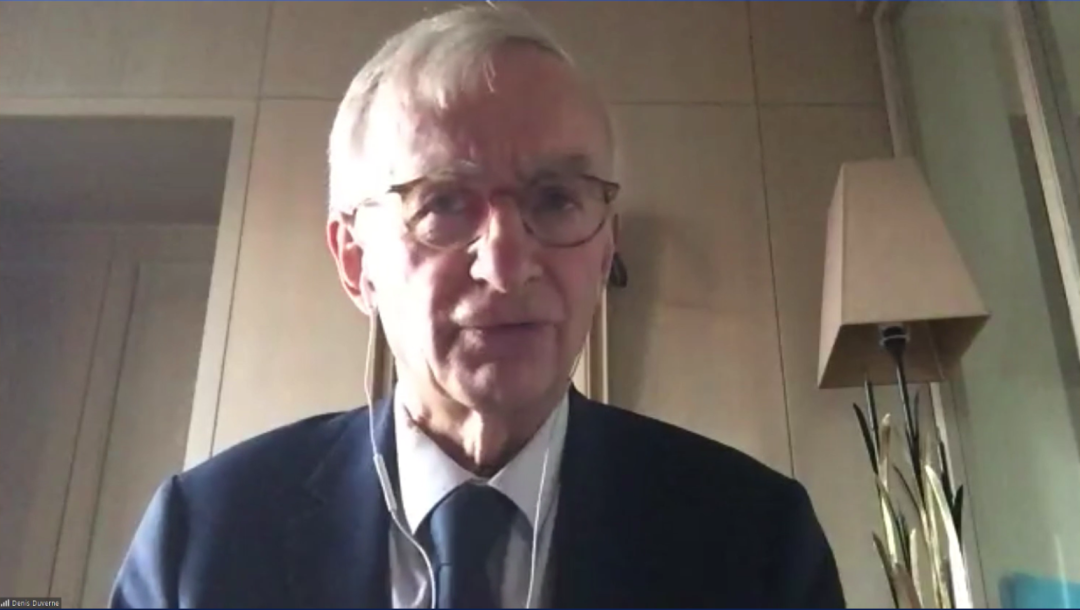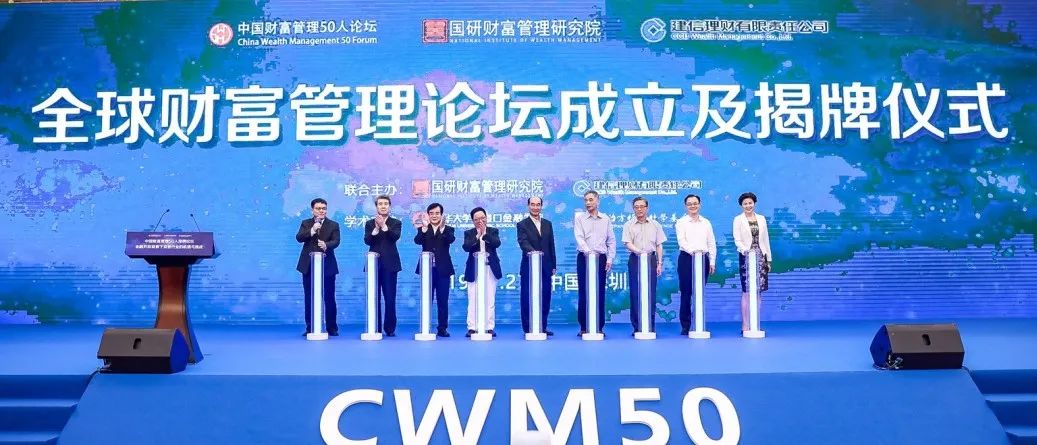安盛集团董事长:后疫情时代,保险行业将如何应对气候变化挑战

安盛集团董事长德尼·杜威先生(Denis Duverne)近日出席全球财富管理论坛上海苏河湾峰会时,就后疫情时代保险行业如何应对气候变化挑战发表了主题演讲。
作为全球最大的保险公司之一,杜威先生开篇便从全球福祉的高度强调了金融及保险领域需要加强合作,协同解决全球性问题。具体而言,安盛集团牵头发起“净零保险联盟”,召集全球主要保险机构共同践行保险行业应对气候变化的承诺。此外,杜威先生先后以安盛集团“煤炭资产剥离计划”和致力于向欠发达地区提供简单、公平、接地气的保险产品等一系列细致而生动的实践,诠释了保险行业无论在资金上游的投资端,还是资金下游的产品端,都将对解决气候变化问题、推动全球经济复苏产生深刻影响。谈及中国市场,杜威先生表示,安盛集团近期正通过与中国普惠金融研究院的联合项目,不断加深对中国贫困人群的研究,以期促进中国普惠金融的发展。
以下为演讲全文。

在2022年全球财富管理论坛
上海苏河湾峰会上的演讲
德尼·杜威
两年多来,新冠疫情一直是人们关注的焦点,特别是随着新的奥密克戎变异病毒的传播,未来仍存在许多不确定性。但我们不能因此而停止关于推动经济复苏思考,这一点很重要。通过此次疫情,我们可以看到所有国家和经济体是如何相互依存的,这提醒我们,我们都生活在同一个星球上。这场公共卫生危机带给我们的关键启示是:通过国际合作,共同努力并协同解决问题,十分重要。在金融和保险领域,这样做便显得尤其必要。
疫情给全世界提出了诸多挑战,但也为金融机构提供了许多合作机会。作为安盛集团的董事长,我想从金融投资者和保险公司的角度着重谈两个合作领域。
我们在本世纪面临的最大挑战之一是气候变化及其造成的后果。我坚信,为了增强应对气候变化的社会韧性,企业、政府和各界领袖必须共同努力。与此同时,金融业内无论是机构自身或是作为一个行业都能发挥关键作用。本着这种精神,安盛集团发起了一个联盟,其目标是通过我们为客户提供的保险和再保险保障为气候中和做出贡献。这就是“净零保险联盟” (NZIA)。其参与方包括保险公司、再保险公司和联合国环境规划署可持续金融倡议组织。该联盟已于2021年7月11日由八家全球保险和再保险公司发起,最近又有五家新成员在2021年10月13日加盟。安盛集团是这个联盟的现任主席单位。
创始签署国之前已经以投资者的角色通过“净零保险联盟”前身,“净零碳排放资产所有者联盟”的会员身份开展了一系列试点工作。在该联盟中,所有八个“净零保险联盟”创始成员(法国安盛、德国安联、英国英杰华、意大利忠利保险、德国慕尼黑再保险、法国再保险、瑞士再保险、瑞士苏黎世保险)已经按照各自净零排放转型路径,为他们的投资组合科学地定制了到2025年的碳减排目标。
此前,安盛集团也主动采取了行动。自2015年开始,我们便启动了全球首个大规模煤炭资产剥离计划。这一决定在当时的金融界引起了激烈的争论。坦率地说,即使在集团内部,这也需要相当多的疏通。幸而,集团内部最终达成了共识:剥离煤炭资产就是在“做正确的事”。后来,商业上的成功也印证了当时的这个决策是对的。彼时,“资产套牢”的概念尚处萌芽阶段,但越来越多的人开始意识到,气候变化有可能严重损害企业估值,投资者甚至可能因此蒙受损失。我们意识到,煤炭业将是最先受到冲击的行业之一。
此外,引领可持续发展是安盛集团战略的关键组成部分。事实上,保持我们在气候领域的领先地位是我们在“驱动增长2023”三年计划下确定的五大优先战略之一。我们欢迎更多保险公司加入“净零保险联盟”,共同应对气候变化。
作为保险公司,我们可以在两个角度做出积极贡献:一方面是从长期投资者的角度,另一方面是从承保服务供应商的角度,通过我们向客户提供的产品和支持来体现。我认为两个角度同等重要。前文谈了一些安盛集团作为投资者在资金上游所采取的行动,接下来我还想与大家分享一些我们作为保险服务商在资金下游所采取的举措。
每一次危机都证明,如果有一张防止人们在灾害来袭时重新陷入贫困的“安全网”,对发展至关重要。为社会打造这张“安全网”就是保险公司的使命。在公共保障缺位时提供保障,或对公共保障系统进行补充,这就是安盛集团在全球范围内许多国家正在进行的实践。
我们估计,目前全球仍有40亿人口属于低收入的基层客户,抗风险能力薄弱。这些人仅靠薪水度日。他们自身、家庭和财产都需要有所保障。但这种保障需求迄今并未得到很好的满足。
因此,我们致力于提供简单、公平、接地气的保险产品。我们认为这是覆盖弱势群体并帮助他们分担所面临风险的关键。这也有助于他们提高整体财务健康状况,最终确保在面对突发事件时实现经济的持续增长。
基于这一战略,我们正为全球2,230万新兴市场客户提供着保障。在我看来,这是对安盛集团“守护生命之本,践行人类进步”这一经营宗旨的直接诠释。
为确保达到我们通过保险产生正面影响的目标,我们已构建了一个框架,以衡量及改善保险活动所产生的影响。该框架包含了许多衡量指标。我只强调其中几个核心指标。首先,我们对以客户为中心的程度和客户满意度进行评估:只有客户觉得物有所值,才能认为此项达标。这包括对产品特性、理赔流程、消费者培育及信息共享质量的详细评估。其次,我们会对那些采取购买保险来控制风险的人群与那些沿用土办法来控制风险的人群进行比较分析。综上,我们确保能够为全社会造附加价值并促进其发展,甚至能够对一定时间内的社会风险管理行为演变进行评估。
我们经常聘请外部研究人员,引导我们朝着正确的方向开展工作。作为最近我们与学术界接触的一个典型,安盛集团与中国普惠金融研究院(CAFI)启动了一个联合项目,旨在更好地了解中国农村和城市地区低收入群体的财务生活状况。我们希望,该项目所带来的研究结果可被所有市场参与者运用,以促进中国的普惠金融发展。
因此,保险是构建弹性发展的关键工具。提高人民面对困难不至重新返贫的能力,这显然是支持发展中经济体繁荣昌盛、韧性十足的关键支柱,而保险正是实现该目的的最佳工具。开发保险的这种用途正是我有幸主持的保险业发展论坛(IDF)的使命。这一具有象征意义的公私合作机构是保险公司、再保险公司、世界银行和联合国开发计划署之间开展国际合作的绝佳例证,其使命是优化和扩大保险及其相关风险管理能力的使用范围,以增强韧性,特别是应对灾害及其相关经济冲击的韧性。
作为保险发展论坛最近与其他组织合作开展的活动和工作的部分例证,其中包括2019年与德国联邦经济合作与发展部(BMZ)和联合国开发计划署(UNDP)签署的三方协议,首批主要项目之一是为秘鲁的50,000所公立学校的保险方案提供资金。由三方协议资助的另一个项目在墨西哥,旨在为小规模玉米种植户提供保险。加纳、尼日利亚、乌兹别克斯坦和孟加拉国的其他类似项目也得到了资助。这些项目将为数百万易受自然灾害影响的人们提供保护。
保险发展论坛的另一个重要合作伙伴是脆弱二十国集团(V20 group),包括世界上最易受气候影响的55个国家,保险发展论坛将为其提供气候风险和韧性分析。这一举措为建立保险发展论坛的全球风险建模联盟铺平了道路,该联盟的使命是支持将气候风险分析作为一项公共产品,向易受影响的国家政府提供一个开放的风险建模平台,并将最权威的全球及地区的数据模型提供给使用者,最终帮助各国加强其自然气候风险管理能力,并建立必要的信任和信心,以吸引面向气候适应与风险融资方向的投资。
在脆弱二十国集团的大多数经济体中,超过98%的损失属于未投保损失,这样便无法保护整个社会以及其来之不易的发展成果。当前,针对气候风险的量化、评级与定价方面的投资,仍主要集中在发达经济体。因此,灾害风险保险等金融保护工具匮乏,致使许多最脆弱的发展中国家负担不起。这在很大程度上是由于这些国家缺乏风险数据来源,缺乏对建立国家灾害风险市场所需的理解,还缺乏作出关键的气候投资决策时所需的政府支持。
保险发展论坛的目标是提高对全球风险的认识,为可持续增长和人类尊严创建弹性平台。为实现这一目标,需要加强协调与合作:要提高全球韧性,解决保障方面的差距。这些工作历来主要由少数私营和公共利益相关方推动。鉴于提高全球韧性和解决保障差距这一挑战的规模、范围和复杂性,采取协调与协作的方式,将保险业与所有相关的公共或私营利益相关方联合起来,这对于满足那些应对气候变化的孱弱群体之保障需求至关重要。
我们非常高兴地欢迎中国再保险于2019年成为保险发展论坛的一员。我相信,这种国际合作将越来越有助于全球发展,具体方式是保护人民,特别是保护欠发达国家的人民不仅免受贫苦,还能免受自然灾害、疫情及气候变化造成的损失。

Speech at GAMF 2022 Shanghai Summit
Denis Duverne
While the Covid pandemic has been a major pre-occupation for over two years now, and there are still many uncertainties, especially with the newly spreading Omicron variant, it is important for us to think about and drive the recovery at the same time. Through this pandemic we can see how all the countries and economies are interdependent, and it reminds us that we all live on the same planet. One of the key takeaways that this sanitary crisis has further highlighted is the importance of international cooperation, working together and collaborating on solutions. This necessity is even more important in the financial and insurance areas.
The pandemic raises a lot of challenges to the whole world, but it also provides many opportunities of cooperation to financial institutions. I would like to focus on two areas of cooperation, from the perspective of an investor and an insurer, which AXA the organization I am Chairman of is.
One of the biggest challenges we are facing in this century is climate change and the consequences caused by this threat. I strongly believe that to build climate resilience, business, government and community leaders must work together; meanwhile financial players have a key role to play, individually and collectively. In this spirit, AXA has initiated an alliance whose goal is to contribute to climate neutrality via the insurance and reinsurance coverage we provide to our customers. This is the Net Zero Insurance Alliance (NZIA), which gathers insurers, reinsurers and the United Nations Environment Program Finance Initiative. The Alliance has been launched on July 11th 2021 by eight global insurance and reinsurance players. Five new members recently joined the Alliance on October 13th 2021. AXA is chairing this alliance.
The NZIA is building on the pioneering work that the founding signatories have already begun as investors through their membership of the Net-Zero Asset Owner Alliance where all eight NZIA founding members (AXA, Allianz, Aviva, Generali, Munich Re, SCOR, Swiss Re, and Zurich Insurance Group) are already individually setting science-based 2025 decarbonisation targets for their respective investment portfolios in line with a net-zero transition pathway.
AXA has also taken action on its own earlier. Starting in 2015, we kicked off the decision to undertake the world's first large-scale divestment from coal. This decision generated a heated debate in financial circles. Even internally, it is fair to say that it required quite a lot of persuading. However, we reached a common conclusion that this was the right thing to do. Furthermore, we were convinced that it was a sound business decision. Back then, the concept of "stranded assets" was still nascent. But more and more people were dawning on the fact that climate change had the potential to severely damage corporate valuations, to the point that investors might suffer. We realized that coal would be amongst the first industries to be hit.
Furthermore, staying at the forefront of sustainability efforts is a key part of AXA's strategy. Indeed, sustaining our climate leadership position is one the five strategic priorities set under our three-year plan, "Driving Progress 2023". We welcome more insurers to join the NZIA to fight together against climate change.
As insurers we have twice the opportunities to make positive contributions, both from a long-term investor perspective but also through what we agree to insure from an underwriting perspective and then via the products and support we offer to our clients, both equally important in my view. The above actions are some of the examples of what we have done as investors. I would also like to share with you some of the initiatives we do as insurers.
Each crisis proves that a safety net, preventing people from falling back into poverty when disaster strikes, is crucial for development. This is the mission of insurance. This is what we deliver in many countries around the world, stepping in when there are no public safety nets or complementing them.
We estimate that four billion people remain vulnerable to unforeseen events while belonging to the low-income to mass market customer segments. Those people earn an income. They need protection for themselves, their families and their assets. But this need for protection is not well addressed today.
Accordingly, we are committed to building simple, fair and accessible insurance products. We see them as the key to reach underserved communities and to enable them to better mitigate the risks they face. This also helps them to increase their overall financial health, ultimately ensuring sustained economic growth in the face of unexpected events.
With this strategy, we are now protecting 22.3 million emerging customers throughout the world. In my view, this is a direct translation of AXA's purpose, "Acting for human progress by protecting what matters".
To ensure we reach our objective of generating positive impact through insurance, we have implemented a framework to measure and improve the impact of our insurance activities. This framework incorporates many metrics. I would like to highlight just a few of them. First, we assess customer centricity and customer satisfaction: we can only reach our goal if our customer finds value for money. This incorporates detailed evaluation of the product features, of the claims process, of the quality of consumer education and of the information shared. Second, we compare the impact of insurance with informal mechanisms people use to manage risks. Hence, we ensure we add value and contribute to development, including by assessing the evolution of behavior over time.
We often involve external researchers to help us steer our efforts in the right direction. A good example of our recent engagement with academics is a joint project that AXA is launching with the Chinese Academy of Financial Inclusion (CAFI) to better understand the financial lives of low-income people in rural and urban areas in China. We hope that this project will bring insights that can be used by all actors to deepen the financial inclusion in China.
Therefore, insurance is a key instrument to build resilient development. Increasing peoples' capacity to face hardship without falling back into poverty is obviously a key pillar of support for a developing society to flourish and be resilient. And insurance is the best tool for this purpose. Developing this use is the mission of the Insurance Development Forum (IDF) which, I have the honor to chair. This emblematic public private institution is a very good example of international cooperation between insurers, reinsurers, the World Bank, and the UNDP, with the mission to optimise and extend the use of insurance and its related risk management capabilities to build greater resilience, particularly from disasters and their associated economic shocks.
Some of the examples of recent engagements and work that the IDF has undertaken by cooperating with other organizations includes a Tripartite agreement that was signed in 2019 with the German Federal Ministry for Economic Cooperation and Development (BMZ) and the United Nations Development Program (UNDP), with one of its first main projects being to fund the design of an insurance program for 50,000 public schools in Peru. Another project being funded by the Tripartite agreement is in Mexico to insure small holder corn farmers, other similar projects are being subsidized for Columbia, Ghana, Nigeria, Uzbekistan and Bangladesh. These programs will help to protect millions of vulnerable people from natural disasters.
Another important partnership the IDF has is with the V20 group, the world's 55 most climate vulnerable countries, for which the IDF will provide risk and resilience analytics. This initiative paved the way for the establishment of the IDF's Global Risk Modeling Alliance, with the mission to support climate risk analytics as a public good by providing vulnerable country governments with an open-access risk modeling platform and the knowledge to utilize the best of global and local models and data that will ultimately help countries strengthen their physical climate risk management capabilities and create the trust and confidence necessary to attract investment in adaptation and risk financing solutions.
In most V20 economies more than 98% of losses remain uninsured, leaving communities and the fruits of hard-won development gains unprotected. At the same time, investments in quantifying, prioritizing and pricing climate risk are mainly concentrated in developed economies of the Global North. Similarly, financial protection tools, such as disaster risk insurance, are least available and not affordable to many of the most vulnerable developing countries. This is in no small part due to a lack of access to the risk data, and understanding necessary to build national disaster risk markets, and support governments in making critical climate investment decisions.
IDF's goal is to improve global risk understanding to create resilient platforms for sustainable growth and human dignity. To achieve this goal, greater coordination and collaboration is needed: Efforts to improve global resilience and address the protection gap have historically been primarily driven by a handful of private and public stakeholders. Given the scale, scope and complexity of the resilience and protection gap challenge, a coordinated and collaborative approach bringing together the insurance industry and all relevant stakeholders, both public and private, is critical to meeting the needs of climate-vulnerable people.
We were very happy to welcome China Re as a member of the IDF in 2019. I am convinced that this kind of international cooperation will contribute more and more to global development by protecting people, especially in underdeveloped countries against not only the poverty, but also the consequences caused by natural catastrophes, the recent pandemic and climate change.
全球财富管理论坛

全球财富管理论坛是在金融开放背景下,为顺应全球资产管理行业发展与中国资产管理行业转型需求,由清华大学经济管理学院、孙冶方经济科学基金会、中国财富管理50人论坛联合发起成立的一个国际性交流平台组织,论坛旨在构建一个汇聚全球资产拥有者和管理者、监管部门和市场代表的长期对话沟通平台,为国内外资产管理机构搭建交流与合作的桥梁。

